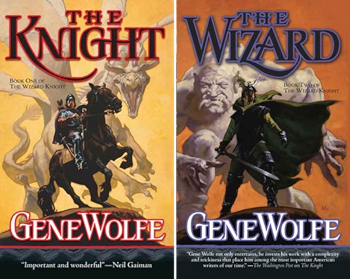 The Wizard Knight by Gene Wolfe
The Wizard Knight by Gene Wolfe
 The Wizard Knight by Gene Wolfe is one of the best fantasy novels to appear in the last decade or so. The novel is split into two separate books, The Knight and The Wizard, but like Gene Wolfe’s classic BOOK OF THE NEW SUN, it’s really one big story split into separate volumes and best read back-to-back.
The Wizard Knight by Gene Wolfe is one of the best fantasy novels to appear in the last decade or so. The novel is split into two separate books, The Knight and The Wizard, but like Gene Wolfe’s classic BOOK OF THE NEW SUN, it’s really one big story split into separate volumes and best read back-to-back.
The Wizard Knight tells the story of Sir Able of the High Heart, a knight who is really a young boy pulled from our own world to Mythgardr, one of seven connected worlds that are mirrored on a combination of Norse mythology, medieval history and Christian theology. One of those other worlds, Aelfrice, is home to Disiri, an Aelf queen who helps Able towards manhood — even though he is mentally still a young boy inside a grown man’s body — and tells him to find the sword Eterne. Able, in love with Disiri, swears not to use any other sword until he finds Eterne, and sets out on his quest.
So far, this may sound like fairly standard fantasy fare, but Gene Wolfe does some really interesting things with this set-up. The structure of the seven worlds is amazing, impossible to summarize here, and worthy of a longer article. Sir Able, the main character, is a study of contradictions: as a young boy, he is filled with images of traditional knighthood, but at times there’s also a casual cruelty in the way he uses his suddenly strong adult body to get his way. There’s a large cast of minor characters, all of which at some point play an important role in the story.
The Wizard Knight is hilariously funny at times and heartbreakingly sad at others. Parts of it read like a traditional story of knighthood and chivalry, and others like a meditation on the nature and role of deity. Gene Wolfe pulls from sources as diverse as Chretien de Troyes, Norse mythology and traditional high fantasy like J.R.R. Tolkien or E.R. Edison, and somehow it all makes sense and turns into a wonderful, deep, rewarding read.
It’s impossible to do this book justice in a short review, but if you have any interest in the fantasy genre, I strongly recommend reading The Wizard Knight. Or as Neil Gaiman put it: “Gene Wolfe is the smartest, subtlest, most dangerous writer alive today, in genre or out of it. If you don’t read this book, you’ll have missed out on something important and wonderful and all the cool people will laugh at you.”
 I love Gene Wolfe but I didn’t love this dreamy and sometimes surreal story as much as Stefan did. There were parts of it that I really enjoyed — the story is often hilarious, as Stefan said, I love love love the cat, and Wolfe’s prose and dialog is just brilliant.
I love Gene Wolfe but I didn’t love this dreamy and sometimes surreal story as much as Stefan did. There were parts of it that I really enjoyed — the story is often hilarious, as Stefan said, I love love love the cat, and Wolfe’s prose and dialog is just brilliant.
My problem is that I just didn’t enjoy most of these characters (other than the cat and dog) or their story, though I did admire the way Wolfe handled their character development. The plot was slow, episodic, and rambling with goals and stakes that didn’t feel important to me. I guess you could say I admired Wolfe’s craft more than his story.
Wolfe is famous for his unreliable narrators and his tendency to deliver layered stories with enigmatic subtexts. I thought something like this was going on the whole time I was reading The Knight and The Wizard, and I thought I knew what it was, but at the end I was still in the dark and felt unsatisfied. I suppose I could go to a Wolfe forum and see what others have said about this aspect of the novels, but I don’t have time for that right now.
The audio versions of these books (2018, Macmillan Audio) are brilliantly performed by Dan Bittner. I applaud Macmillan Audio for recently focusing on some important older SFF works.
~Kat Hooper





Quick comment before I pop in and read the rest of this review–this looks right up my alley. I love Knighthood stories and while I’m not as big on wizards, I’m already interested enough to want it.
Now on to the rest of the review!
I have to admit I’m kind of the opposite of Tia, I love wizard stories but not so big on knights. I have to agree though that this book looks really interesting. I might have to pick up his ‘Book of the New Sun’ as well, I knew I had seen that name but I’ve never gotten around to reading him. Looks like it’s time to change that.